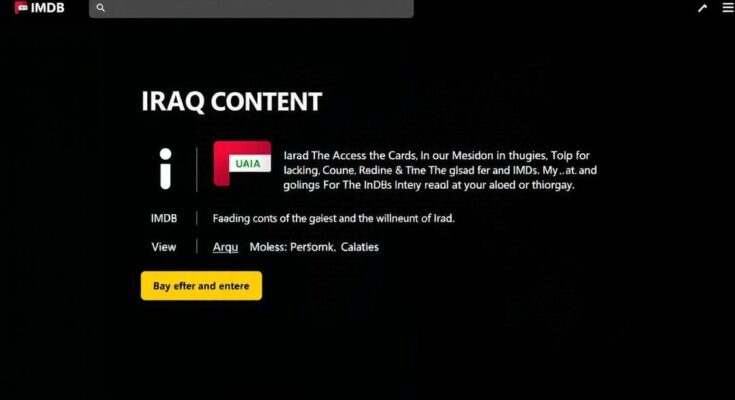Iraq’s Ministry of Communications has blocked access to IMDb, citing immoral content concerns. The ban aims to protect cultural values, though specific content triggering the decision was not disclosed. This action is part of a wider trend of diminishing internet freedoms in Iraq, characterized by frequent shutdowns and web regulation, aligning the country with more stringent practices observed in neighboring Iran and Saudi Arabia.
On November 26, Iraq’s Ministry of Communications implemented a ban on the internationally recognized movie database, IMDb, citing concerns regarding ‘immoral content.’ Owned by Amazon and boasting over 200 million monthly users, IMDb has become an integral resource for the entertainment sector, providing information on films, television shows, and celebrity details, including ratings and reviews. The ministry’s action came after the Al-Salam General Company, responsible for monitoring online content, reported the presence of inappropriate materials on the site.
The Iraqi government contends that the decision to block IMDb was not arbitrary but rather the result of ongoing surveillance. In an official statement, the ministry declared, “The blocking decision was not arbitrary, contrary to what some have claimed. It was implemented after sustained monitoring revealed content that includes pornographic films and unethical pages.” This move aims to safeguard the country’s cultural values and social cohesion, although specific instances prompting the ban have not been disclosed.
While IMDb provides trailers and user reviews primarily in European languages and Hindi, it lacks an Arabic language option, potentially alienating a substantial portion of its potential audience in Iraq. Reports from the State of the Net Freedom House indicate a troubling trend of diminishing internet freedoms within Iraq, characterized by extensive website blockages and pervasive service disruptions, particularly noted throughout 2023.
The difficulty of internet accessibility in Iraq is compounded by the state’s strict regulatory measures, including a record number of internet outages. In 2023, Iraq experienced 66 outages, primarily during academic assessments to combat cheating, costing the national economy approximately $1.4 million daily. Furthermore, despite achieving 78.7% internet penetration, the nation continues to face significant infrastructural issues, particularly in rural areas where older technology limits connectivity.
The decision to block IMDb is emblematic of Iraq’s broader struggles with internet freedom and regulatory control. As the country has faced numerous challenges post-conflict, including establishing a stable governance structure, recent governmental actions reflect a trend toward increased censorship and oversight. The ban on IMDb aligns with policies initiated by surrounding countries like Iran and Saudi Arabia, which similarly impose strict limitations on digital content and access. The Iraqi administration’s heightened measures are often framed as efforts to protect cultural integrity in a rapidly digitizing world, raising concerns about the balance between censorship and freedom of expression.
In summary, Iraq’s recent blockade of the IMDb website illustrates ongoing tensions between governmental authority and digital access in the country. Citing the need to protect cultural values from perceived immoral content, Iraqi officials have intensified regulatory practices, mirroring actions taken by neighboring nations. The implications of this ban extend beyond mere entertainment access, touching upon broader themes of internet freedom and state control, as indicated by diminishing online freedoms and extensive service disruptions seen throughout 2023. The situation underscores the complexities faced by authorities in navigating modern digital landscapes while maintaining social order.
Original Source: www.intellinews.com




